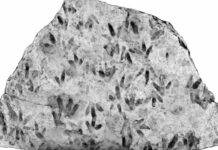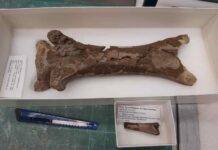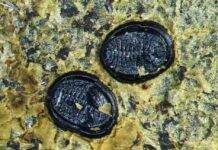
A team of Montana State University paleontologists have identified several new types of dinosaurs from fossil evidence discovered in eastern Idaho, demonstrating the presence of a much more diverse group of theropods in the area than was previously known.
The findings were published earlier this month in Historical Biology: An International Journal of Paleobiology. MSU doctoral student L.J. Krumenacker in the MSU College of Letters and Science’s Department of Earth Sciences was the lead author of the study. Others who contributed to the work were Krumenacker’s adviser, MSU paleontology professor David J. Varricchio, MSU graduate student Garrett Scofield and current Boise State University adjunct professor and former MSU graduate student Jade Simon.
The fossils, found in the Wayan Formation, which occurs on lands administered by Caribou-Targhee National Forest, represent at least three newly discovered types of theropod — the family of dominantly carnivorous dinosaurs which include animals such as Tyrannosaurus rex. In fact, these formerly unrecognized dinosaurs, which date back to about 95 million years ago, include small- to mid-sized tyrannosauroids, Krumenacker said. Based mostly on fossilized teeth, he estimates the possible larger tyrannosauroid was about the size of a horse, with the small tyrannosauroid being similar in size to a retriever-sized dog.
Also among their findings were a pair of fossilized eggs of a large oviraptorosaur -the largest dinosaurs known to have existed in Idaho. The eggs are the first evidence that oviraptorosaurs lived in the area at that time.
The discoveries are significant, Varricchio said. Dinosaur fossils are rare to find in Idaho and these are some of the few that date back to the middle Cretaceous period.
“We don’t really have many dinosaurs from this time period,” he said. “This new evidence is really filling in the time, temporal and spacial gap.”
Krumenacker, who hails from Idaho, has been searching his home state for dinosaur remains for more than a decade — since he was an undergraduate at Idaho State University.
“He’s made himself the expert on Idaho dinosaurs,” Varricchio said. “He’s largely been the person to describe the Idaho dinosaurs.”
But aside from fossilized evidence of Oryctodromeus cubicularis — a burrowing dinosaur that lived around the same time as these newly discovered tyrannosauroids — the Idaho finds have been limited at best.
“It’s just disappointing,” Krumenacker said. “You’d like to find more. But it just drives me to look more. Persistence pays off — now we’ve found these other fossil localities giving a lot of more data on the animals present at the time.
“The challenge is identifying the animals based on the fragmentary specimens we find,” he added. “I put my best effort into it. It’s possible I could discover some identifications are wrong if we find more complete remains later. But I’d be thrilled because then we’d have an even better understanding. I’d really like to find more.”
The specimens will be curated at the Idaho Museum of Natural History in Pocatello, which holds the permit that allowed the collection of these fossils. A permit is required for all vertebrate fossils collected from federal lands.
Reference:
L.J. Krumenacker, D. Jade Simon, Garrett Scofield, David J. Varricchio. Theropod dinosaurs from the Albian–Cenomanian Wayan Formation of eastern Idaho. Historical Biology, 2016; 1 DOI: 10.1080/08912963.2015.1137913
Note: The above post is reprinted from materials provided by Montana State University.










